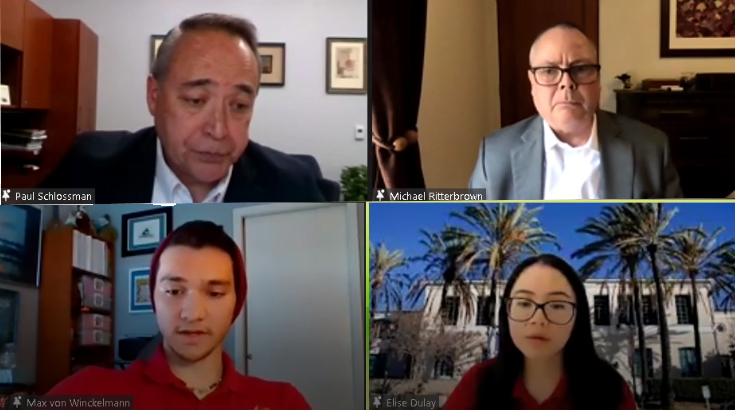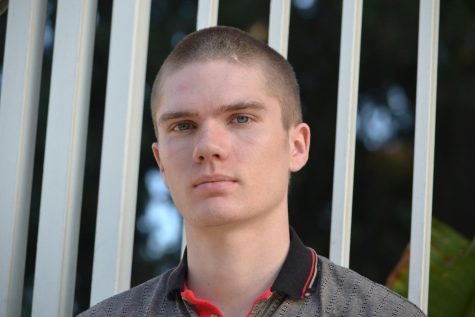Campus reopening mandates: Masks, but no vaccines or negative tests
GCC officials explain their evolving plans during virtual town hall
GCC officials answer questions at reopening town hall. Attendance during the virtual meeting fluctuated, peaking at 145 people.
Glendale Community College’s administrative officials said their plan for a safe campus reopening will not include mandatory COVID-19 vaccinations or negative tests for the virus.
Officials answered questions from students, staff and others during a virtual town hall meeting held May 13 by the college’s Associated Students. The meeting was led by ASGCC President Elise Dulay and ASGCC’s vice president of Organizations, Max Von Winckelmann. Answers came from GCC’s vice president of Student Services, Paul Schlossman, and vice president of Instructional Services, Michael Ritterbrown.
The first question was: “What is the percentage of students that need to be vaccinated in order for GCC to be considered safe?” Ritterbrown said it was difficult to determine a safe vaccination level because it is still being discussed at the state and national levels. While campus reopening will not be based on vaccination percentage, he said, “We are strongly recommending that all individuals be vaccinated, not just before returning to GCC, but in the service of the community at large.”
However, he said, “Campus has no plans to require vaccines of students or staff.” He also mentioned that the plans by the University of California and California State University systems cannot go into effect until the FDA fully approves the vaccine.
A negative COVID-19 test also will not be required to be on campus.
“Currently, the college does not have plans to implement mandatory testing for students or all members of the college community,” Schlossman said.
Right now, only the intercollegiate athletics program implements mandatory testing because it is required to comply with the California Community College Athletic Association regulations.
The main requirement of students on campus is to wear masks at all times.
The campus also plans on making some changes to physical operations to enhance safety.
Overall, the campus will align with safety regulations set by the state and Los Angeles County. To do this, measures will be taken on campus to prevent crowding that could reduce social distancing. These will include designated paths throughout campus, staggered scheduling and strict monitoring of tight spaces.
Another physical change to the campus are new HVAC systems being installed in every room of every campus building to improve ventilation. The work is expected to be complete by August. Ritterbrown described the upgrades as “impressive” and “quite sophisticated.”
Student services throughout campus will be adopting a new “hybrid approach,” according to Schlossman. This includes in-person availability but also more online accessibility, which should help to lower occupancy.
The handling of campus common areas and certain interactions, such as tutoring, are still being determined.
As for classes, GCC will continue to provide several types of learning environments. Students will have the choice of enrolling in an in-person class, hybrid class or online class, either synchronous or asynchronous. The types of settings offered depend on the course and availability based on enrollment. While the modality of classes will stay the same throughout a semester, if restrictions need to be heightened, an in-person class could potentially move to an online format.
In the upcoming fall semester, GCC will continue to be primarily remote, with possible exceptions for certain performance and lab classes.
Reopening the campus is an ongoing process subject to continual revision, said Dr. David Viar, GCC’s president/superintendent.
“This is not about a light switch being turned on or off,” Viar said. “It is about the dimmer switch and gradually adjusting and making a difference as it reflects what is needed at that particular time.”
Questions for the next town hall can be submitted at www.glendale.edu/townhall.
Jack Morris can be reached at [email protected].


